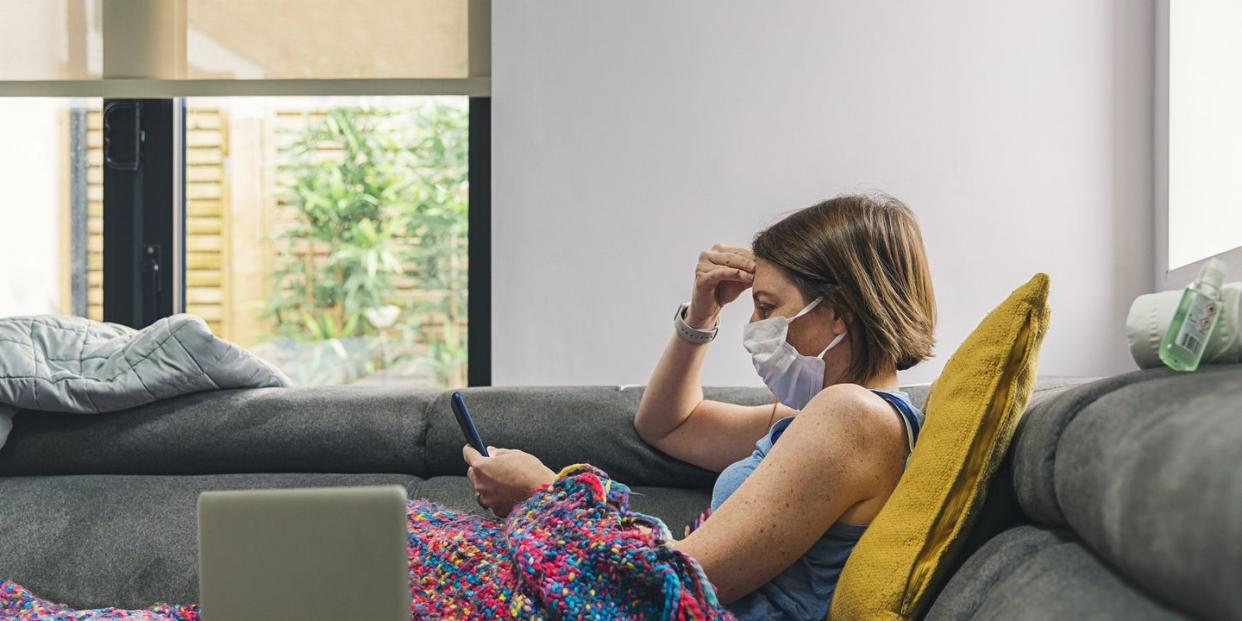All Your Questions About the 2020 Cold and Flu Season, Answered

Every year, right around the end of summer, talk starts to turn to the coming cold and flu season. Is it going to be a rough one? How good is the vaccine? What steps should I take to keep my family safe? This year, those questions can be a lot more confusing thanks to the continuing impact of COVID-19. That’s where this guide comes in. Read on to see how doctors and infectious disease experts think this season is going to shake out, and what you need to know.
Why does the flu spread particularly well in cold weather?
“The classic respiratory virus season starts around November and ends in February or March,” says Steven Pergam, MD, medical director of infection prevention at Seattle Cancer Care Alliance. “In the winter, cold, dry air tends to be more able to transmit infections, and people are inside more with others, where the viruses can be passed around.”
How bad is the flu going to be this year?
The quick answer is: Experts just don’t know yet. There were reports of a very light flu season in areas of the southern hemisphere (where the flu ramps up during our summer months), but that doesn’t always correlate to how hard the United States will be hit. And the number of people traveling by air (or lack thereof this year) also plays a factor in transmitting the flu across countries and oceans.
“Every area of the world—and even the country—can be affected differently by the flu,” says Christienne Alexander, MD, president of the Florida Academy of Family Physicians. “That said, the things we’re already doing to protect ourselves from getting COVID-19, like social distancing, wearing masks, and washing hands, mean there’s a chance it may not be as bad this year.”
How good will this year’s flu vaccine be?
Every year, the vaccine can vary in effectiveness, but it’s too early to say how good this year’s vaccine is. “Even if it’s only 60 percent effective, that means 60 percent of the people who get the vaccine won’t get the flu at all,” says Dr. Alexander. “And if you get the vaccine and still catch the flu, it may not be as severe an illness for you.”
She does caution that getting the shot might look a little different this year. “In the past, offices would often set up flu shots for employees to get at work. That will probably not be happening this year,” she says. “But there will still be plenty of opportunities to get the shot, like at your local pharmacy.” Find a nearby place to get the flu vaccine at vaccinefinder.org.
What is the big fear about having a flu season during the COVID-19 pandemic?
In a nutshell, adding people sick with the flu to a health care system already struggling with COVID-19 means hospitals and doctors’ offices are likely to get overwhelmed. “More people will be coming into the hospital with respiratory symptoms, and we’ll need to sort out if they have COVID-19 or not,” says Dr. Pergam. “That means a lot more testing, a lot more use of PPE (personal protective equipment), and a lot more putting people in isolation—it’s a large burden.”
Can you get the flu and COVID-19 at the same time?
Unfortunately, you can be sick with one disease and still get the other. But there haven’t been enough cases for doctors to determine how having one impacts the severity of the other. What is known is that both the flu and COVID-19 have lingering effects on your immune system, leaving you more susceptible to get sick with the other disease down the road. “Your immune system stays weakened even after you recover from the flu or COVID-10,” says Dr. Alexander. “So if you get the flu, you might be likelier to get COVID-19, and vice versa.”
What’s the best way to keep myself and my family safe?
Definitely make sure everyone gets the flu shot—preferably before the end of October to make sure it works through the entire flu season. “I look at the flu vaccine the same way I look at wearing a mask—you’re protecting others as well as yourself,” says Dr. Pergam. “There are a lot of people with weakened immune systems or who can’t get the flu vaccine, like newborns and those with cancer. Getting vaccinated protects those people as well as you.” The Centers for Disease Control and Prevention also recommends keeping your distance from anyone who is sick, washing your hands regularly, reducing how often you touch your face, and disinfecting surfaces that you touch often—all actions you’re likely already taking.
You Might Also Like

